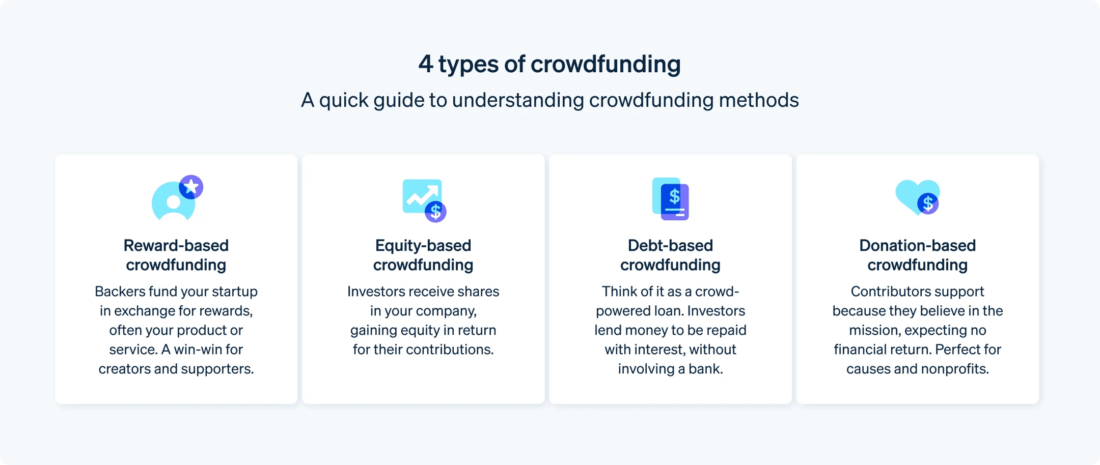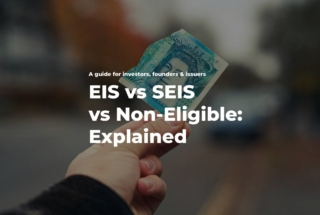Pros and Cons of Crowdfunding
No time to read? Let AI give you a quick summary of this article.
Crowdfunding has emerged as a transformative method for raising capital. It enabled individuals, startups and even established businesses to secure funding from a broad audience, typically via online platforms. This approach democratizes the investment landscape by allowing everyday people to support projects they believe in. However, like any financial strategy, crowdfunding comes with its own set of advantages and disadvantages.
This article delves into the general pros and cons of crowdfunding and examines its viability as a business model.
What you will learn in this post:
Pros of crowdfunding for project owners
For project owners, crowdfunding delivers the following benefits:
- Easier access to capital
- Market validation
- Community development
- More control over equity
- Flexible funding
Access to capital without traditional barriers and challenges
Crowdfunding provides entrepreneurs with a viable alternative to conventional financing methods, such as bank loans or venture capital. This is particularly beneficial for businesses that may lack a strong credit history or collateral1. Those projects that don’t opt for equity-based crowdfunding, can raise funds without giving up on their equity.
Market validation and exposure
Launching a crowdfunding campaign can serve as a test for the viability of a product or service. A successful campaign indicates market interest and demand. Additionally, campaigns often generate buzz and increase visibility, and with it, they contribute to the project’s marketing efforts2.
Building a community of supporters
Crowdfunding gathers a community around a project. Backers often become brand advocates3, they provide feedback, share the project within their networks and contribute to its overall success. This engaged audience can be very important for future fundraising campaigns.
Retention of equity and control
Unlike traditional equity financing, certain types of crowdfunding, such as reward-based, donation-based or loan-based models, do not require entrepreneurs to give up ownership stakes. This allows creators to maintain full control over their ventures and avoid the dissolution of their equity.
Flexible funding options

Crowdfunding offers various models — donation, rewards, equity and debt-based. It allows entrepreneurs to choose the option that best fits their needs and financial goals without the rigid terms often associated with traditional financing.
Cons of crowdfunding for project owners
Even though crowdfunding can be highly beneficial, it also has some drawbacks:
- Competition
- Uncertainty
- Resource intensive
- IP risks
- Money laundering
Uncertain and competitive funding environment
Only slightly over 22%5 of all crowdfunding campaigns reach their funding goals.
The landscape is highly competitive, with numerous projects trying to get attention. If a business fails to stand out, it leads it underfunded.
Significant time and resource investment
Running a successful crowdfunding campaign demands considerable effort6 in planning, marketing, and continuous engagement with backers. This process can be time-consuming and may divert focus from other critical aspects of the business.
Risk of intellectual property theft
Crowdfunding campaigns often require creators to publicly share detailed information about their projects, which can expose unprotected intellectual property (IP) to theft7, infringement, and misuse.
To mitigate these risks, it’s crucial for creators to understand IP basics, conduct thorough clearance searches, and implement robust protection strategies before launching a campaign. Utilizing confidentiality and non-disclosure agreements can help minimize the risk of internal leaks and external espionage. Failure to address these IP risks can lead to costly legal battles, brand damage, and potential project abandonment.
Potential for scams and money laundering
The crowdfunding space is not immune to fraudulent activities. Scammers may exploit the platform, leading to a loss of trust among potential backers and making it harder for legitimate projects to secure funding.
Pros of crowdfunding for investors
Before investing in a project raising funds on a crowdfunding campaign, investors shall consider all pros and cons. The main advantages are the following:
- Early-stage investment options with growth potential
- Portfolio diversification
- Impact investing
Access to early-stage opportunities
Crowdfunding platforms allow investors to support startups and innovative projects that might not be accessible through traditional investment channels. This early involvement can lead to substantial returns if the venture succeeds.
Portfolio diversification
Through crowdfunding, investors can access a variety of projects across different industries. It helps them to diversify their portfolios and potentially mitigate risks associated with investment.
Engagement in project growth
Investors can contribute ideas and feedback and enhance the project’s success. This engagement leads to a feeling of ownership and impact on the project’s development
Cons of crowdfunding for investors
Among all the drawbacks of investing in crowdfunding, the following may be the most important:
- High risks
- Limited liquidity
- Long-term commitment
- Due diligence challenges
High risk
Investing in early-stage ventures is inherently risky. Many startups fail to deliver expected returns, and the lack of historical performance data makes it challenging to assess potential success. If a crowdfunding platform suspends its activity, it may take a lot of time and effort for investors to recover their funds.
Limited liquidity
Crowdfunding investments, especially in equity, often lack secondary markets. It makes it difficult for investors to sell their stakes before the company achieves an exit event, such as an acquisition or public offering.
Extended waiting period for an exit event
Investors typically wait about 10 years to see returns from startup investments and around 5 years for investments in REITs.
Information asymmetry
Investors may have limited access to comprehensive information about the project’s viability, which makes it difficult to perform due diligence. This asymmetry can result in uninformed investment decisions.
Pros of crowdfunding as a business model
Crowdfunding can be a profitable business model, whether you focus on debt, equity or donations. They have different target audiences and purposes, but all of these models can be monetized.
With crowdfunding becoming regulated and globally recognized, it becomes a proven business model to explore.
Let’s talk about the pros of crowdfunding as your online business model.

Recurring revenue from transaction fees
Crowdfunding platforms often generate income through transaction fees charged on each contribution. As businesses launch multiple campaigns or receive ongoing support, these fees can provide a steady revenue stream for the platform operators. Considering that the more projects succeed, the more fees are generated, this model is mutually beneficial for projects, platforms, and investors.
Demand for alternative finance
There’s a growing demand for alternative financing options8 as traditional funding ways become more stringent. Crowdfunding meets this need by offering accessible capital to businesses that might not qualify for conventional loans or investments. It democratizes the investment process, allowing a diverse range of investors to participate in funding opportunities.
Regulatory support in many regions
In several jurisdictions, regulatory frameworks have evolved to support and facilitate crowdfunding activities. For instance, the UK’s Financial Conduct Authority (FCA) has established guidelines9 to ensure that crowdfunding operates transparently and protects investors. Such regulatory support can enhance credibility and attract more participants to crowdfunding platforms.
Cons of crowdfunding as a business model
Although, crowdfunding as a business model is a great option, it has its own risks that businesses need to consider before building an online investment platform.
Compliance complexities
Navigating the regulatory landscape of crowdfunding can be complex. Businesses must adhere to various legal requirements, including investor disclosures and reporting obligations. Failure to comply can lead to legal repercussions and damage to reputation. The need for robust compliance measures can be resource-intensive, especially for startups with limited legal expertise.
Need for strong investor protection measures
Ensuring the protection of investors is crucial in crowdfunding. Without adequate safeguards, investors may face risks such as fraud or mismanagement of funds. Implementing robust investor protection measures10 is very important to maintain trust and encourage continued participation in crowdfunding platforms.
Long sales cycles
Crowdfunding campaigns often have extended durations11, sometimes lasting several months. During this period, the platform and the project must maintain investor interest and engagement, which can be resource-draining. The prolonged sales cycle can delay product launches or other business initiatives and impact the overall growth and profitability.
Highly competitive market
The proliferation of crowdfunding platforms has led to intense competition. Differentiating a platform requires continuous innovation, effective marketing strategies, and the ability to attract high-quality projects to maintain credibility and user trust.
Strict financial regulations
Financial regulations governing crowdfunding can be stringent and vary across regions. Businesses must navigate these regulations carefully to avoid legal pitfalls. Inconsistent regulations can also pose challenges for platforms operating in multiple jurisdictions, requiring tailored compliance strategies for each market.
Conclusion
Crowdfunding is a powerful financial tool which has many advantages and disadvantages for all parties involved — investors, fundraisers and platform owners.
LenderKit can help platform owners to reduce risks and eliminate some disadvantages completely.
If you are thinking about launching a crowdfunding platform, LenderKit offers white-label crowdfunding software that will help you get started quickly.
Equipped with useful integrations for payment processing, KYC/AML and document management, businesses can run a fully operational crowdfunding platform and even request on-demand customizations to build a unique marketplace.
To find out how our white-label crowdfunding software works, don’t hesitate to get in touch with us.

Article sources:
- Crowdfunding Pros and Cons for Startups
- Advantages and Disadvantages of Seeking Crowdfunding - Shopify
- Pros and Cons of Crowdfunding for Your Startup - Visible.vc
- What is crowdfunding? Here are four types to know | Stripe
- Crowdfunding Statistics 2025: Insights & Global Market Trends
- Crowdfunding: Pros and Cons | Startups.com
- One moment, please...
- Alternative Lending Market Size, Share | Industry Report 2035
- Crowdfunding | FCA
- Implementing robust investor protection measures
- How Long Should You Run Your Crowdfunding Campaign?



